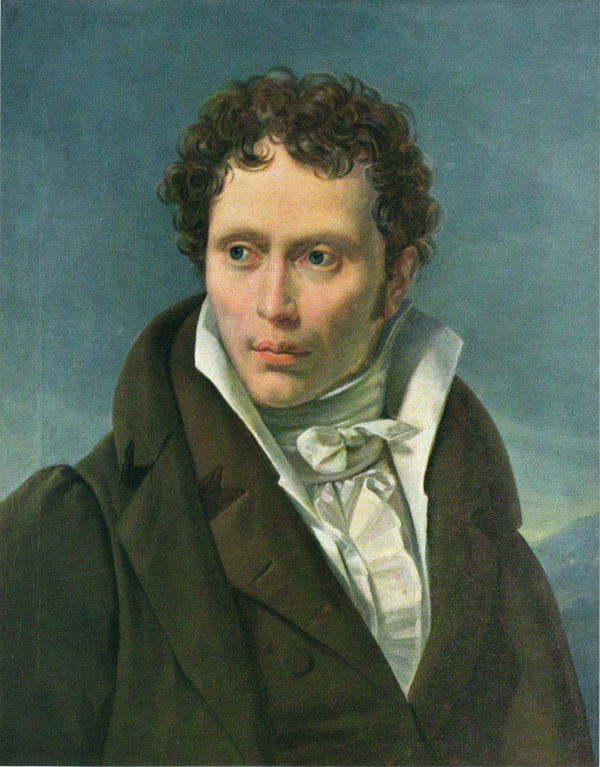
Ich erkenne in den tiefsten Tönen der Harmonie, im Grundbaß, die niedrigsten Stufen der Objektivation des Willens wieder, die unorganische Natur, die Masse des Planeten. Alle die hohen Töne, leicht beweglich und schneller verklingend, sind bekanntlich anzusehen als entstanden durch die Nebenschwingungen des tiefen Grundtones… Dieses ist nun dem analog, daß die gesammten Körper und Organisationen der Natur angesehen werden müssen als entstanden durch die stufenweise Entwickelung aus der Masse des Planeten: diese ist, wie ihr Träger, so ihre Quelle: und das selbe Verhältniß haben die höheren Töne zum Grundbaß… Nun ferner in den gesammten die Harmonie hervorbringenden Ripienstimmen, zwischen dem Basse und der leitenden, die Melodie singenden Stimme, erkenne ich die gesammte Stufenfolge der Ideen wieder, in denen der Wille sich objektivirt. Die dem Baß näher stehenden sind die niedrigeren jener Stufen, die noch unorganisch, aber schon mehrfach sich äußernden Körper: die höher liegenden repräsentieren mir die Pflanzen- und die Thierwelt… Endlich in der Melodie, in der hohen, singenden, das Ganze leitenden und mit ungebundener Willkür in ununterbrochenem, bedeutungsvollem Zusammenhange eines Gedankens von Anfang bis zum Ende fortschreitenden, ein Ganzes darstellenden Hauptstimme, erkenne ich die höchste Stufe der Objektivation des Willens wieder, das besonnene Leben und Streben des Menschen.
In the deepest notes of the harmony, in the ground bass, the will begins to objectify itself, I recognize the mass of the planet and inorganic nature. All the higher notes, easily mobile and sounding more quickly, are to be understood as emerging from the repercussions of the deep notes of the ground bass… This is to be understood as parallel to the fact that all bodies and organizations of nature must be viewed as arising through the development of the substance of the planet, step by step: as its bearer, so its source, and the same relationship can be established between the higher notes and the bass notes… And further in all the array of steps that follow the ripieno voices which produce a harmony, between the bass and the leading voice which carries the melody I recognize the full series of ideas in which the will objectifies itself. Those which stand closer to the bass are the first such steps, which are not yet organic, but are in a multiplicity of external forms: the higher notes represent to me the world of plants and animals… And lastly in the melody, in the high, singing, integral principal voice, which reflects an uninterrupted, meaningful connection of a thought progressing from the beginning to the end, I recognize the highest stage of objectification of the will, the contemplative life and strivings of the human.
—Arthur Schopenhauer, Die Welt als Wille und Vorstellung, vol i, bk iii, sec 52 (1819)(S.H. transl.) in Schopenhauers sämmtliche Werke in fünf Bänden, vol i, pp. 346-48 (E. Grisebach ed. 1922).
In Schopenhauer’s philosophy, music is given a role apart from all other arts in that it alone is capable of direct interaction with the will. Other arts constitute ideas which may objectify the will indirectly. But music exists apart from humankind and its world; it is primordial. Schopenhauer is embracing the Platonic-Pythagorean view of music, and adapting it as an important pillar of his philosophical system. But he connects this with the evolution of music and the preeminent art form of his own age. “Music does not express this or that particular and definite joy, this or that sorrow, or pain, or horror, or delight, or merriment, or peace of mind; but joy, sorrow, pain, horror, delight, merriment, peace of mind themselves, to a certain extent in the abstract, their essential nature, without accessories, and therefore without their motives. Yet we completely understand them in this extracted quintescence. Hence it arises that our imagination is so easily excited by music, and now seeks to give form to that invisible yet actively moved spirit world which speaks to us directly, and to clothe it with flesh and blood, i.e., to embody it in an analogous example. This is the origin of the song with words, and finally of the opera, the text of which should therefore never forsake that subordinate position in order to make itself the chief thing and the music the mere means of expressing it, which is a great misconception and a piece of utter perversity; for music always expresses only the quintescence of life and its events, and never these themselves, and therefore their differences do not always affect it. It is precisely this universality, which belongs exclusively to it, together with the greatest determinateness, that gives music the high worth which it has as the panacea for all our woes. Thus if music is too closely united to words, and tries to form itself according to the events, it is striving to speak a language which is not its own.”
The opening (Einleitung) of Richard Strauss’s tone poem Also sprach Zarathustra, op. 30 (1896) can be understood as an effort to compose the vision Schopenhauer presents above. Strauss commences the piece with a sustained double low C, 32′ pitch, on double basses, contrabassoon and organ–the “deepest notes of the ground bass”–the sound heard before the dawn of humanity. Strauss, of course, draws inspiration from Nietzsche’s work, and in their brilliant 1968 film, 2001: A Space Odyssey, Arthur C. Clarke and Stanley Kubrick use Strauss’s music and Nietzsche’s ideas to great effect, evoking the philosophical evolution of humankind. But it is too often forgotten that Nietzsche, in turn, drew on the discussion of the role of music found at the end of book three of the first volume of Die Welt als Wille und Vorstellung.


